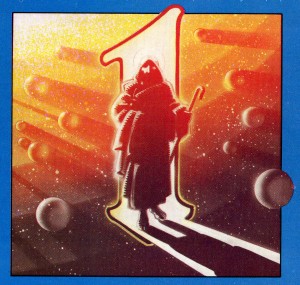John 1.1: “In the beginning was the word, and the word was with God, and the word was God.”
It sure sounds like Genesis 1.1, doesn’t it? It was intentional. John wanted to make the connection, but he’s pushing us further back than Genesis 1. “In the beginning” (Greek en archei) means “before everything else,” but since he uses it in combination with “The Word” (a philosophical term used by Heraclitus), he means it in the sense of “origin,” or “basic cause.” So what John is saying at the outset is: This man (The Word) is the basic cause, or origin, of all things. He is at the root of the universe. There was never a time when the Word was not. This beginning had no beginning because there has to have been something that always was.
What John is saying is that Jesus is the divine First Cause—the root and source of all things living and non-living. We say of things: “Well, it all had to start somewhere.” Indeed it did: Jesus. In the beginning was Jesus. He was distinct from God the Father, but distinctly God at the same time.
Just as Genesis 1.1 presupposes the existence of God, so also John doesn’t argue the existence of God. Either God exists and is the Creator of the universe, or matter is eternal, or it has come out of nothing all by itself. The Bible teaches the eternal existence of an eternal God, and he is Jesus, the same as Yahweh. He always was.
Even the verb John uses (“was”—en) speaks of continuing existence, not a coming into being.
The Word
And what’s with this weird name, “The Word”? The ancient Greek philosopher Heraclitus used it for the principle which controls the universe. The Stoics used it for the soul of the world that gave meaning to everything, and Homer used it to express what it is that needs to be expressed. I think you’re catching on. John is saying that Jesus is the full expression of God. In Psalm 33.6, the Word is the agent of creation, and in Hosea 4.1 he is God’s message to his people. He is God’s law and the standard of holiness in Psalm 119.11. What John is telling us here is very deep and profound as he tries to help us understand the identity of Jesus.
…and the Word was with God…
Without getting into the boring parts of grammar, the idea is that when it says “The Word” was with God, it claims intimate equality: two living, intelligent, and active personalities in a living union despite being separate entities. The concept is so important he repeats it again in verse 2: “The same (Word) was in the beginning with God.” John thinks there is no contradiction between the Word and God. They exist in the closest possible connection.
…and the Word WAS God.
More grammar. There was never a time when the Word was anything but God himself. He (the Word) is the origin, the root, fully intelligent and personal, and Divine. And just to make clear, it is not possible that the verse can be interpreted, “…and the Word was a god.” Nor is it possible to translate it as “…and God was the Word.” John is not trying to show who God is; he is showing us who The Word is. He is stating nothing less than the fully deity of The Word.
What is being said about Jesus here is nothing less than earth-shattering and jaw-dropping.
He was not just a prophet, a great teacher, or a good man, though he is all of those things. John was saying that this man stands next to God as his equal, and also is one and the same with Him, and he sees no contradiction in making the claim. Is it true? The rest of the book of John is written to give piece after piece, episode after episode of evidence.
